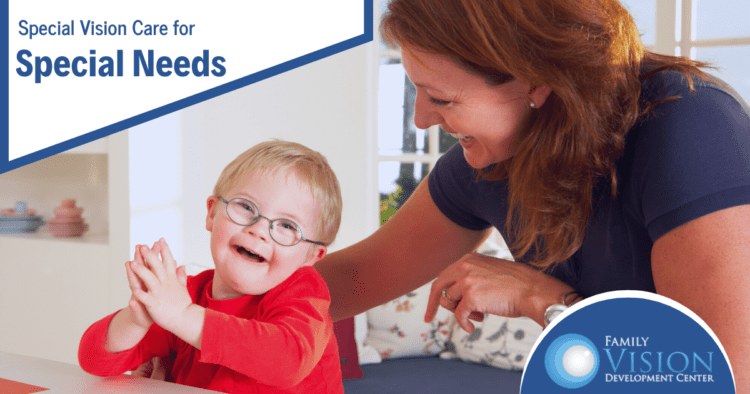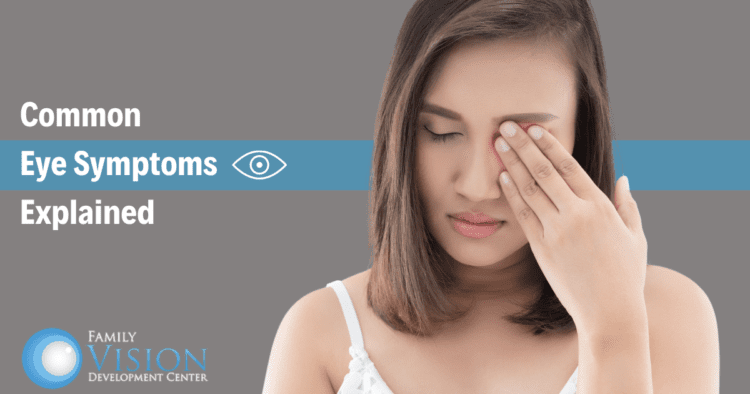Children with special needs such as Down Syndrome, Fragile X Syndrome, autism spectrum disorders, premature birth or other genetic disorders are often faced with many challenges throughout life. One of those challenges that can affect them on a daily basis is the risk of developing a vision disorder.
While the vision disorders that affect kids with special needs can be the same as those of neurotypical kids, they tend to experience them at a higher rate. For this reason, it’s important to keep up on regular eye exams in order to detect the following types of issues.
- Focusing issues – the inability to focus on objects that are either close up or far away
- Tracking issues – eye movements may be slow, inaccurate or jump around
- Poor visual attention – the inability to filter out non-essential visual information when viewing the world
- Poor eye teaming and coordination – problems with both eyes working together in a coordinated way
- Poor hand-eye coordination – difficulty completing a physical task based on the visual information received by the eyes
Watch for These Signs
Even if your child is not able to clearly articulate a vision issue, there are certain signs that you can look for that could indicate a problem:
- Skips or repeats words or lines when reading
- Closes one eye when reading
- Poor reading comprehension
- Trouble concentrating when reading
- Holds books very close when reading
- Messy handwriting
- Unusual neck or body posture
- Trips frequently or knocks things over
- Experiences motion sickness
- One or both eyes turn inward or outward
Vision Therapy for Special Needs
The specially trained optometrists at Family Vision Development Center provide individualized, one-on-one vision therapy programs that can be an extremely effective form of treatment for kids with a vision disorder. Once we have clearly identified the visual issue, this vision therapy serves as a kind of re-training of the eyes and brain to develop or restore proper visual function.
At Family Vision Development Center, we understand the importance of providing the best possible care for kids with special needs. And our caring providers always strive to help every child overcome their challenges and achieve the most healthy vision possible. Contact our Aurora office at 630-862-2020 to learn more or to schedule your appointment.
Additional information can be referenced here
Have you ever been sitting quietly, perhaps watching television, and out of nowhere your eye starts twitching? It may seem to be completely random, but there are many possible reasons for this strange occurrence. In fact, people often experience eye symptoms that are questionable. What do they mean? Do you need to seek treatment? Here are a few common eye symptoms and what may be causing them.
Crust
One of the more common eye symptoms is waking up with some crust, or “sleep”, in your eyes, and is perfectly normal as it is simply residue from the eye’s natural protective process. However, while finding crust-like residue in the corners of your eye or on your lashes is fine when waking after sleeping, crusty eyes during waking hours could be caused by a condition known as blepharitis, or inflammation of the eyelids, which you should get medical attention for. In fact, any eye discharge that is more than simple flakes after sleeping could be an indicator of a greater issue, such as dry eye or pink eye (conjunctivitis).
Red eyes
Red eyes are another one of those eye symptoms that is usually harmless, but not in every case. Red eyes occur when the tiny blood vessels on the whites of your eyes expand, making them appear red. In most instances, it is caused by a relatively harmless factor like fatigue, allergies, smoke, chlorine or wearing your contacts too long. However, red eyes that last more than a day or two could indicate a more serious problem such as an eye infection, a corneal ulcer or glaucoma.
Eye twitching
Almost every person experiences some form of eyelid twitching in his or her lifetime. Known medically as myokymia, these involuntary spasms of the eyelid muscles can occur every few seconds over the course of several minutes. Typically, eyelid twitching is a harmless annoyance brought on by stress, lack of sleep, caffeine, tobacco use or even exercise. But in some cases, it can result from a more serious issue. An eye twitch that doesn’t go away relatively quickly can be a sign of a brain or nerve disorder such as Bell’s Palsy, Parkinson’s Disease, Tourette Syndrome or Multiple Sclerosis.
Blurred vision
Some eye symptoms, like blurred vision, could indicate a serious issue and should be discussed with your eye doctor. Blurred vision can indicate myopia (distant objects are blurry), hyperopia (difficulty focusing on close objects), astigmatism (blurred vision at all distances) or presbyopia (normal age-related vision problem). Each of these conditions can be treated relatively easily with corrective eyeglasses or contact lenses. However, there are more serious conditions that might be present if you are experiencing blurred vision. These could include cataracts, glaucoma, age-related macular degeneration, diabetic retinopathy or cardiovascular disease.
Yellow eyes
A yellow appearance in your eye can be harmless, or serious, so it is important to see your eye doctor for an accurate diagnosis. For example, yellow spots on your eyes can simply be protein, fat or calcium growths that are not a cause for concern unless they are interfering with your vision. In contrast, if the whites of your eyes are instead yellow, that can be a sign of jaundice which could be caused by hepatitis, gallstones or even liver cancer.
You can never be too careful when it comes to taking care of your vision. Even a simple issue could be a sign of a more serious problem if it doesn’t clear up quickly. So it’s important to trust your gut when it comes to any kind of problem that you are experiencing with your eyes.
At Family Vision Development Center we offer full service eye care. This means we can provide all of the vision needs for your whole family. This includes general eye exams, advanced vision therapy services, contact lens fittings and the ability to diagnose and treat ocular disease such as glaucoma, cataracts, macular degeneration, dry eye and diabetes just to name a few. Contact our office at 630-862-2020 for information or to schedule your appointment.
Additional information can be referenced here and here.



